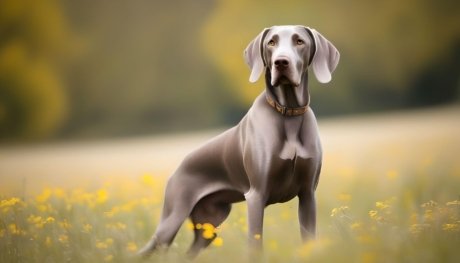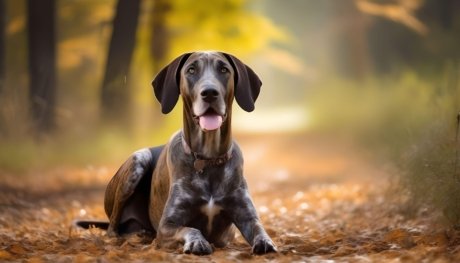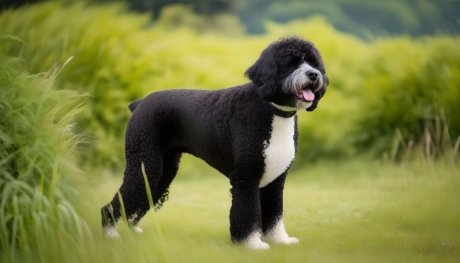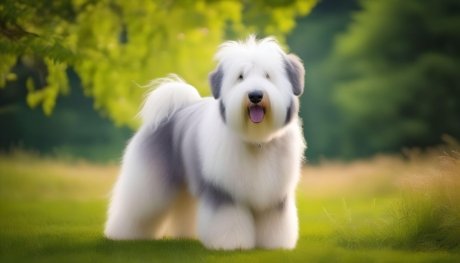Long Coat German Shepherd | Price, Breed Profile, Care Tips, Health
Welcome to our guide on Long Coat German Shepherds. Whether you’re considering adding one to your family or simply curious about this stunning breed, we’ve got you covered. In this article, we’ll explore their distinctive features, temperament, and care requirements. Get ready to uncover the allure of their flowing coats and dive into the captivating world of Long Coat German Shepherds.
Long Coat German Shepherd
The Long Coat German Shepherd is a stunning and beautiful breed when it comes to canine companions. This gorgeous dog has captured the hearts of many dog lovers all over the world with its flowing fur and royal appearance.
Long Coat German Shepherds are known for their intelligence, loyalty, and flexibility. Because of their remarkable trainability and protective attitude, they are much sought after as both household pets and working dogs. The German Shepherd is an excellent choice for a caring companion or a dependable working partner.

One of the breed’s most distinguishing characteristics is its silky long coat, which distinguishes it from the more frequent short-haired German Shepherds. The long, thick fur not only contributes to their visual appeal, but it also protects them from the weather. It should be noted, however, that the long coat requires frequent maintenance to keep it in excellent shape and avoid matting.
Long Coat German Shepherds are well-known for their calm and collected demeanour. They are often polite and caring with their family members, forging lifelong ties. While they may look cautious in the presence of outsiders, they are naturally protective and will go to great measures to defend their loved ones if necessary.
Exercise is crucial for the physical and mental well-being of this breed. Long Coat German Shepherds are active dogs that thrive on regular exercise and mental stimulation. Engaging them in activities such as obedience training, agility courses, or long walks not only keeps them physically fit but also helps channel their energy in a positive direction.
When it comes to training, Long Coat German Shepherds shine brightly. They are quick learners and have an innate desire to please their owners. Consistent and positive reinforcement methods work best with this breed, as they respond well to praise and rewards. Early socialization and obedience training are essential to ensure that they grow up to be well-adjusted and well-behaved companions.
Long Coat German Shepherd Puppies
Long Coat German Shepherd puppies exhibit all of the characteristics that distinguish the adult breed. They are extremely bright, devoted, and ready to please. Their capacity for instruction and friendship becomes clear as they develop. These puppies have the ability to exceed your expectations, whether you are looking for a loving pet or a future working dog.

German Shepherd pups have silky, fluffy fur, which is one of their most attractive characteristics. The coat on these puppies is thicker and longer than that of their short-haired cousins. It not only makes them cuddlier, but it also protects them from the weather. Keep in mind, however, that their luscious coat requires frequent brushing in order to be clean and tangle-free.
Temperament-wise, Long Coat German Shepherd puppies are known to be engaged and curious. They accept life with great enthusiasm and create profound connections with their human family members quickly. While they may be wary of strangers as first, their natural protective instincts will strengthen as they age, making them ideal watchdogs and devoted friends.
Types of Long Coat German Shepherd Dogs
Long Coat German Shepherds, also known as Long-haired German Shepherds, come in various types based on their lineage, coat colour, and working ability. Let’s explore some of the different types of German Shepherds:
Show Line Long Coat German Shepherds:
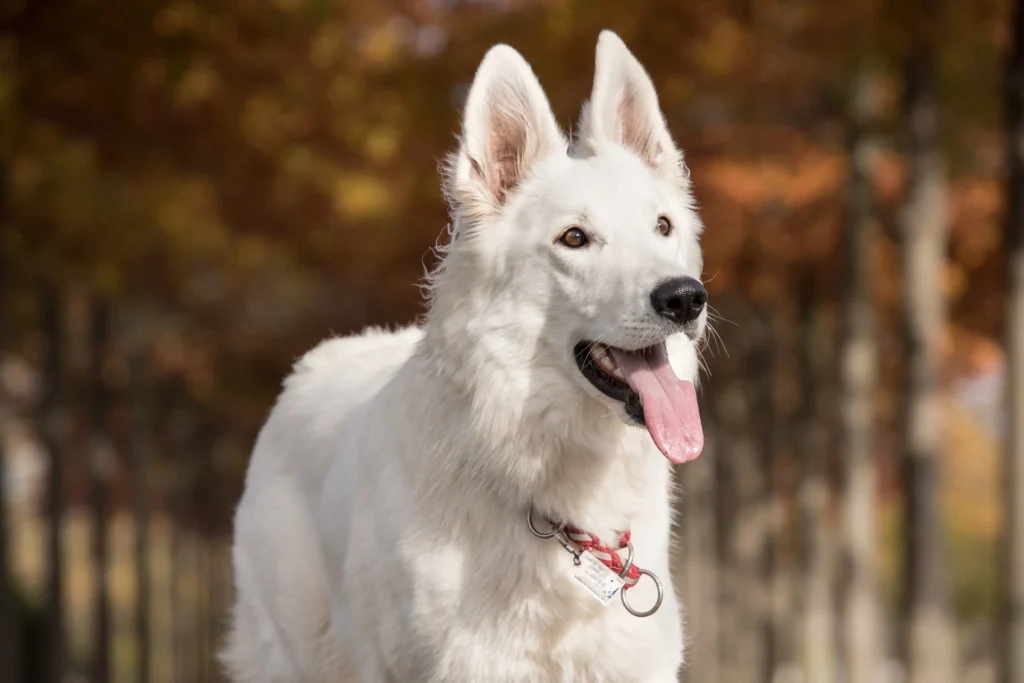
These dogs are bred specifically for conformation shows and adhere closely to breed standards in terms of appearance and movement. Show line Long Coat German Shepherds often have a calmer temperament and a focus on beauty and elegance.
Working Line Long Coat German Shepherds:

These dogs are bred for their working abilities and excel in tasks such as police work, search and rescue, and service dog roles. Working line Long Coat German Shepherds possess high drive, intelligence, and a strong work ethic.
American Long Coat German Shepherds:

This type of Long Coat German Shepherd has been selectively bred in the United States and may have some differences in appearance and temperament compared to their European counterparts. American German Shepherds can be found in both show line and working line variations.
European Long Coat German Shepherds:
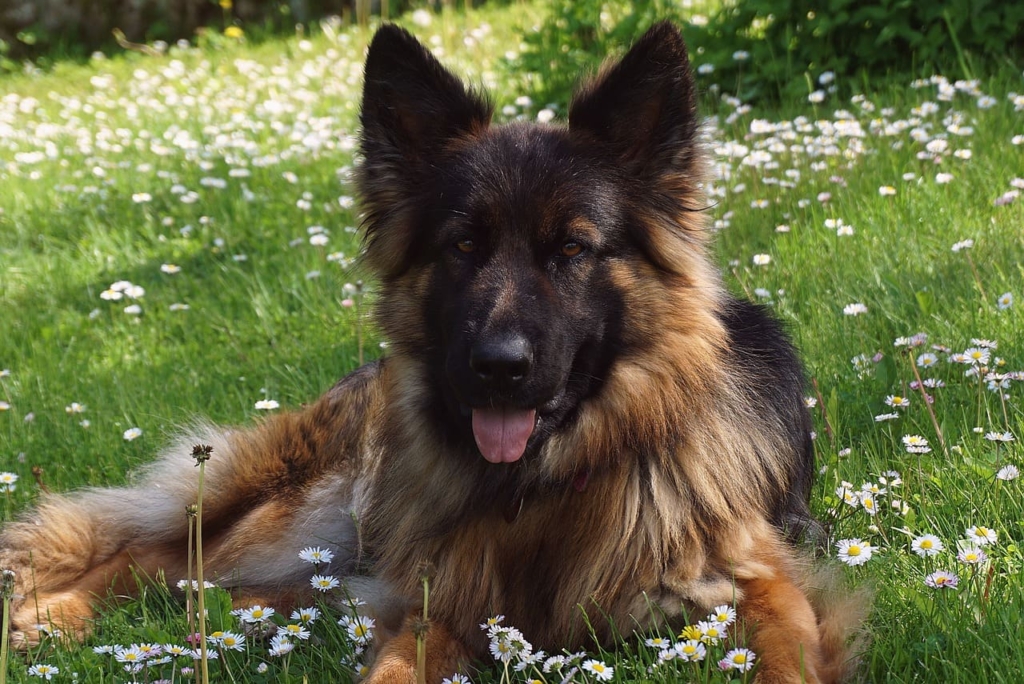
Bred primarily in European countries, these dogs often have a more robust and powerful build compared to other types. European Long Coat German Shepherds are known for their versatility and are commonly utilized in working roles such as protection and sport.
Bi-Colour and Sable Long Coat German Shepherds:

While the classic black and tan colouration is common among German Shepherds, there are also bi-colour and sable variations. Bi-color Long Coat German Shepherds typically have a predominantly black coat with tan markings, while sable German Shepherds display a range of shades from light to dark in a pattern resembling that of a wild wolf.
History of Long Coat German Shepherd Dog
The Long Coat German Shepherd dog has a rich history that dates back to the early 20th century in Germany. It originated from the working line German Shepherds, which were initially bred for herding and guarding livestock. As the breed gained popularity, some German Shepherds developed longer and thicker coats due to a recessive gene. These dogs were eventually recognized as a distinct variation and became known as German Shepherds.
Appearance of Long Coat German Shepherd Dogs
Long Coat German Shepherds are known for their stunning appearance. They have a well-proportioned body with a strong, muscular build. What sets them apart is their long and flowing double coat, which is thicker and softer compared to the short-haired German Shepherds. The coat comes in various colours, including black and tan, bi-colour, and sable. Their expressive eyes and alert ears add to their captivating charm.
Temperament of Long Coat German Shepherd
The temperament of Long Coat German Shepherds is often described as intelligent, loyal, and confident. They are known for their unwavering devotion to their families and are excellent companions. These dogs are highly trainable and thrive on mental stimulation and regular exercise. They are protective by nature and make excellent guard dogs, but early socialization is crucial to ensure they are well-mannered and friendly with strangers.
Behaviour of Long Coat German Shepherd Dog
Long Coat German Shepherds display a variety of breed-typical behaviours. They are noted for having a lot of energy and require continuous physical and mental activity to keep them from becoming bored and acting out. These dogs are eager to pick up new skills and thrive at a variety of sports like as obedience, agility, and tracking. They may be friendly and affectionate to their family members, including children and other pets, with correct training and socialisation.
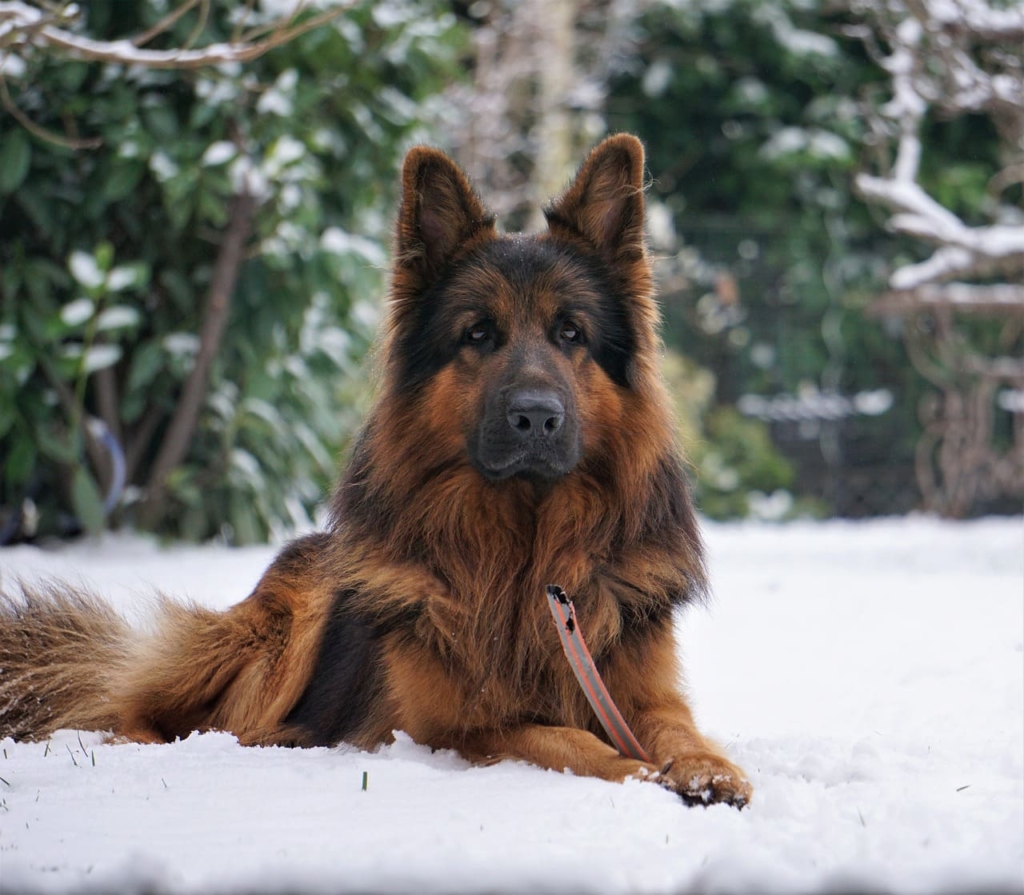
Long Coat German Shepherd Price In India
In the United States, the average price range for a Long Coat German Shepherd puppy is typically between $1,500 and $3,000 USD. In India, the price of a German Shepherd puppy can vary depending on the breeder, location, and quality of the dog. On average, the price range for a Long Coat German Shepherd puppy in Indian Rupees (INR) is typically between ₹30,000 to ₹80,000 INR.
German Shepherd Price
The price of a German Shepherd can vary depending on various factors such as the dog’s lineage, age, training, and location. In the United States, the average price range for a German Shepherd puppy from a reputable breeder is typically between $800 and $2,500 USD. On average, the price range for a German Shepherd puppy in Indian Rupees (INR) is typically between ₹15,000 to ₹50,000 INR.
German Shepherd Puppy Price
In the United States, the average price range for a German Shepherd puppy from a reputable breeder is typically between $800 and $2,500 USD. In India, the price of a German Shepherd puppy can vary based on factors such as the breeder’s reputation, location, and the quality of the dog. On average, the price range for a German Shepherd puppy in Indian Rupees (INR) is typically between ₹20,000 to ₹60,000 INR.
Factors that Affect the Price of Long Coat German Shepherd Dog
The price of a Long Coat German Shepherd dog can be influenced by several factors. These include the dog’s lineage, pedigree, health certifications, and the reputation of the breeder. Dogs from champion bloodlines or those with exceptional traits and characteristics may command higher prices. Additionally, geographical location and demand for the breed can also impact the price.
Monthly Maintenance Cost of Long Coat German Shepherd Dogs:
Owning a Long Coat German Shepherd dog comes with certain maintenance costs. These include expenses such as high-quality dog food, regular grooming, vaccinations, routine vet visits, and possible training sessions. German Shepherds have thick coats that require frequent brushing to prevent matting. Proper nutrition, exercise, and preventive healthcare contribute to their overall well-being.
Availability of Long Coat German Shepherd Dogs in India:
German Shepherd dogs are relatively popular in India, and they can be found through reputable breeders across the country. However, their availability may vary depending on the specific region. It is recommended to research and reach out to trusted breeders or rescue organizations that specialize in Long Coat German Shepherds to inquire about availability, as well as the specific qualities and characteristics you are looking for in a dog.

Facts about Long Coat German Shepherd
Here are some key facts about Long Coat German Shepherds:
- Long Coat German Shepherds have a double coat, with a longer and thicker outer coat and a soft undercoat.
- Their long fur provides them with added insulation and protection from varying weather conditions.
- German Shepherds require regular grooming to prevent matting and keep their coat healthy and clean.
- They are known for their striking appearance, with flowing fur and a regal presence.
- Long Coat German Shepherds have the same intelligence, loyalty, and trainability as their short-haired counterparts.
- They are versatile working dogs and excel in roles such as search and rescue, police work, and service dog tasks.
- Long Coat German Shepherds are highly protective of their family and make excellent guard dogs.
- They have a calm and composed temperament, but early socialization and training are important for well-rounded behaviour.
- Long Coat German Shepherds require regular exercise and mental stimulation to keep them physically and mentally healthy.
- They form strong bonds with their owners and are known for their unwavering loyalty and devotion.
Pros and Cons of Long Coat German Shepherd
Here are some pros and cons of Long Coat German Shepherds:
| Pros | Cons |
|---|---|
| Striking and regal appearance | High grooming requirements |
| Excellent guard and family dogs | Can shed excessively |
| Intelligent and trainable | Can be prone to certain health issues |
| Versatile working dogs | Require regular exercise and mental stimulation |
| Loyal and devoted companions | Can be territorial and protective |
| Highly protective of their family | Early socialization and training is important |
Care Tips for Long Coat German Shepherd Dog
Taking proper care of your Long Coat German Shepherd is essential for their well-being. Here are some care tips to keep in mind:
- Grooming: Long Coat German Shepherds have a dense double coat that requires regular grooming. Brush their fur several times a week to prevent matting and remove loose hair.
- Bathing: Bathe your Long Coat German Shepherd as needed, using a dog-friendly shampoo. Avoid over-bathing to prevent drying out their skin.
- Exercise: Long Coat German Shepherds are active dogs that require daily exercise. Engage them in activities like walks, runs, or play sessions to keep them physically and mentally stimulated.
- Training and Socialization: Start training and socializing your Long Coat German Shepherd from an early age. Enrol them in obedience classes and expose them to various people, animals, and environments to promote good behaviour and confidence.
- Health Check-ups: Regular vet check-ups are crucial to monitor your dog’s health. Keep up with vaccinations, deworming, and preventive medications recommended by your veterinarian.
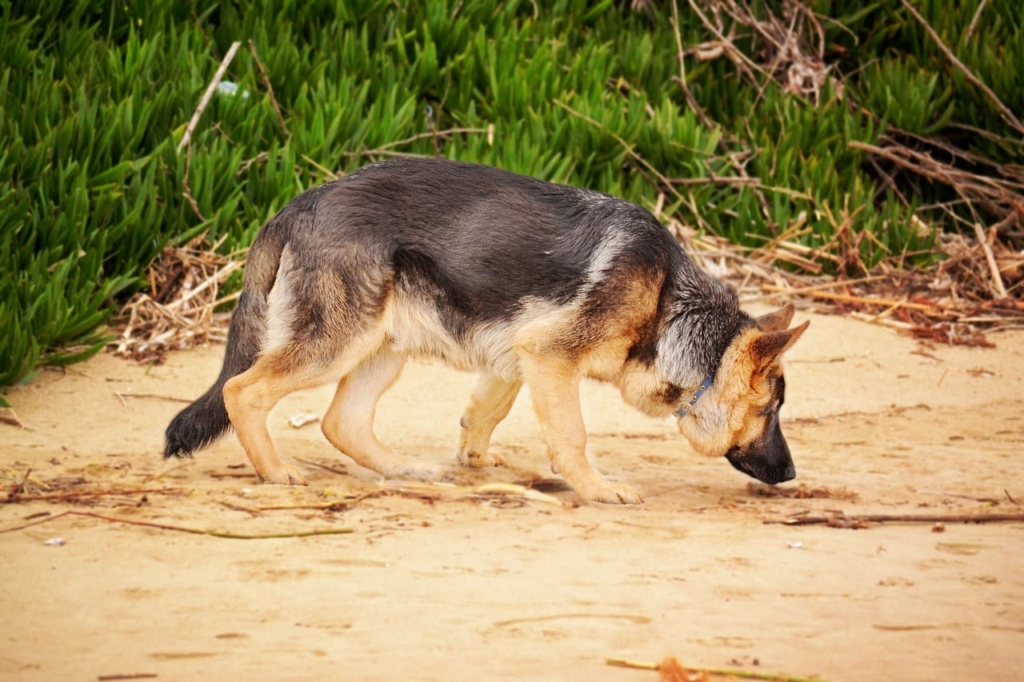
Health Issues of Long Coat German Shepherd Dog
While German Shepherds are generally healthy dogs, they may be prone to certain health issues. Some common health issues that can affect them include:
- Hip and Elbow Dysplasia: Long Coat German Shepherds may be susceptible to hip and elbow dysplasia, which are developmental conditions affecting the joints. Regular exercise, a balanced diet, and appropriate breeding practices can help minimize the risk.
- Degenerative Myelopathy: This is a progressive neurological disease that can affect the spinal cord of Long Coat German Shepherds. Early detection and management can help maintain their quality of life.
- Gastric Dilatation-Volvulus (Bloat): German Shepherds can be prone to bloat, a potentially life-threatening condition. Feeding them smaller, frequent meals and avoiding vigorous exercise immediately after meals can help reduce the risk.
Long Coat German Shepherd Dog Lifespan
On average, Long Coat German Shepherds have a lifespan of 10 to 14 years. Proper care, a balanced diet, regular exercise, and routine vet check-ups can contribute to a longer and healthier life for your furry companion.
Food for Long Coat German Shepherd Dogs
Food for Long Coat German Shepherd Dogs:
| Food Type | Pros | Cons |
|---|---|---|
| High-quality dry dog food | Provides balanced nutrition | Can be expensive depending on the brand |
| Raw or BARF diet | Offers natural, unprocessed food | Requires careful meal planning and preparation |
| Wet or canned dog food | Helps with hydration | Can be more expensive and has a shorter shelf life |
| Homemade dog food | Allows for control over ingredients | Requires knowledge of canine nutrition and recipe formulation |
| Grain-free dog food | May benefit dogs with grain sensitivities | Some studies suggest potential link to heart disease |
Names for Long Coat German Shepherd Dogs
Names for Long Coat German Shepherd Dogs:
| Category | Names |
|---|---|
| Traditional Names | Max, Bella, Rocky, Luna, Zeus |
| Strong Names | Thor, Athena, Titan, Valkyrie |
| Noble Names | Duke, Duchess, Prince, Princess |
| Nature-Inspired Names | Aspen, Willow, Atlas, Luna |
| German Names | Fritz, Gretchen, Kaiser, Liesel |
| Unique Names | Koda, Nyx, Zephyr, Seraphina |
Long Coat German Shepherd Video
Video of German Shepherd Dog to let you understand German Shepherd Dog care tips, food, lifespan, and other factors. Video Credit: All About Dogs
Conclusion:
Long Coat German Shepherds are lovely, intelligent dogs who require regular grooming, exercise, and training. They may be susceptible to some health conditions, but with good nutrition and veterinary care, they may have happy lives. When it comes to eating, alternatives include high-quality dry food, raw diets, wet food, and cooked meals. Choosing a name for your Long Coat German Shepherd can be a personal decision since there are many alternatives. Overall, these dogs provide joy and company to their family, and they flourish when they are loved and pampered.
Frequently Asked Questions:
Here are Frequently Asked Questions on Long Coat German Shepherd Dogs:
-
How long do German Shepherds live?
On average, German Shepherds have a lifespan of 9 to 13 years. With proper care and a healthy lifestyle, some can live even longer.
-
Are German Shepherds good family dogs?
Yes, German Shepherds are known to be loyal and protective, making them excellent family dogs. They form strong bonds with their owners and are often great with children when properly socialized.
-
How often should I groom my German Shepherd?
German Shepherds have a dense double coat and should be brushed at least a few times a week to prevent matting and control shedding. Additionally, regular bathing, nail trimming, and ear cleaning are important parts of their grooming routine.
-
Do German Shepherds require a lot of exercise?
Yes, German Shepherds are an active breed and require regular exercise to keep them physically and mentally stimulated. Daily walks, playtime, and engaging activities like obedience training or agility can help meet their exercise needs.
-
Are German Shepherds easy to train?
Yes, German Shepherds are highly intelligent and trainable dogs. They excel in obedience training and can be taught various commands and tasks. Consistency, positive reinforcement, and early socialization are key to successful training.
-
Do German Shepherds have any health issues?
Like all breeds, German Shepherds can be prone to certain health issues. Common concerns include hip and elbow dysplasia, degenerative myelopathy, bloat, and allergies. Regular vet check-ups, a balanced diet, and appropriate exercise can help maintain their overall health.
-
Are German Shepherds good guard dogs?
Yes, German Shepherds have a natural protective instinct and are often used as police and guard dogs. Their alertness, loyalty, and intelligence make them well-suited for such roles.
-
Can German Shepherds live in apartments?
While German Shepherds are a larger breed, they can adapt to apartment living if provided with sufficient exercise and mental stimulation. However, access to outdoor space for exercise is still beneficial.
-
How much do German Shepherds shed?
German Shepherds are known to be moderate to heavy shedders, especially during shedding seasons. Regular grooming and brushing can help minimize loose hair in the house.
-
Are German Shepherds good with other pets?
With proper socialization and training, German Shepherds can get along well with other pets in the household. Early exposure and positive experiences are key to fostering good relationships.
Recommended –
Doberman Rottweiler Dog | Price, Breed Profile, Care Tips, Health, Availability
Labrador Husky | Price, 6 Types, Breed Information, Health, Care Tips


























